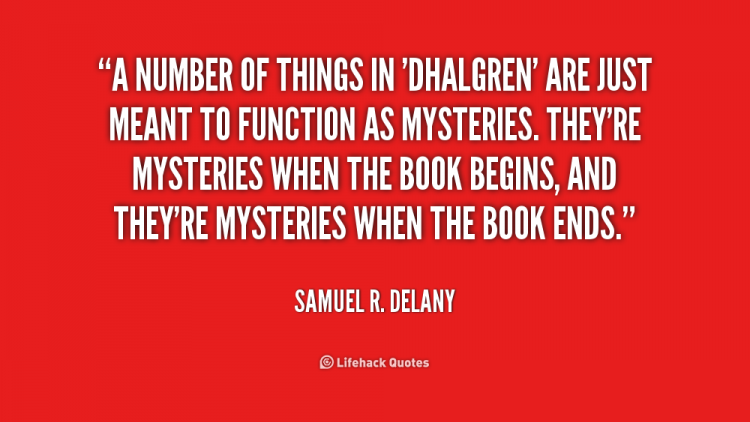A review of Samuel R. Delaney’s book Dhalgren.
I have read this book many times in my life.
The first time I read this book, I was about sixteen years old and even at that early an age (for this sort of book, that is a fairly early age), the imagery haunted me. A city on the edge of nothing, wreathed in smoke and fog and fires that never went out. Things would burn down, there would be fire and chaos, and the next day, those same buildings would be intact — subtly different, but intact. The bloody sun leaping into the sky, curling in a short arc, and dropping back out in a matter of hours. A man who can’t remember his name writing poetry in a half-filled book claimed by no one else. A newspaper that has the same date on it whenever it’s published. Flashing flowers of razor brass blades strapped to hands with leather thongs. Brilliant gangs of holographic creatures marching down dark, silent streets. Two moons blazing in the sky, people staring in awe.
This I remember from the first time I read it, more than twenty years ago.
Now, I read it again and all of these images are there, all as brilliant and vivid as before and there’s even more than that — a woman shifting, melding, turning into a weeping tree beneath her lover’s protesting hands, people sheathed in chains of crystal prisms, each chain found in circumstances as cryptic as they are individual. The snapping of power projectors, filling a dark street with the dancing lights of mythical creatures, scorpions, hippogriffs, dragons, and one amorphous blob. A boy at the bottom of an elevator shaft, his body broken and shattered, carried to his mother, testing her own limits against the environment of an insane city. Outrageous and marvelous sex in lofts and rooms. Houses packed with people, dangerous, lazy, and unforgettable. A girl, barely a woman, orbiting around her only lover, loathing him, loving him, and terrified of him. Red eyes glowing in the dark night and blind people with pits for eyes being led through fires and raining debris. Artichokes. The voice from behind the bricks. The mouse on the moon that no one ever knew about.
Good science fiction leaves you breathless. It takes what you know and pushes you to a place you never expected to be. Good science fiction leaves you uncomfortable, feeling awkward, feeling raw, even, as if to say “There, but for the grace of God go I.” Sometimes I like to read to escape and sometimes I like to read to be glad I already have.
Dhalgren is the story of a stable system, a city of perpetual and unbelievable violence and savagery. It’s the story of a man entering the city — a man with no name and no memory — a poet, a visionary, a lover, a madman. But in this city, in Bellona, where night and craziness and unreality rules, twin moons lurk in the sky and the occasional giant sun casts a sickly light below, this madman makes his own place and calls it home. Here he finds a new family, a family that treats him as a new person, and they aren’t bothered by his past or his name or his purpose, they all have their own pasts and names and purposes to forget.
It’s like that, but more stunning, more crisp, and more beautiful.
Dhalgren is available on Amazon.

